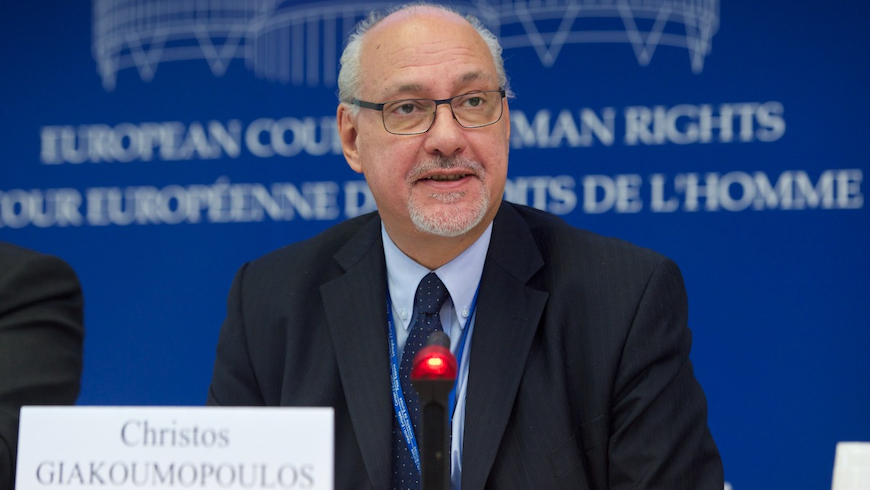Opening speech by Christos Giakoumopoulos
FATF/OSCE/MONEYVAL workshop for judges and prosecutors: Experiences, Challenges and Best Practices
26 March 2018, Strasbourg
Dear Mr President of the FATF,
Dear Mr President of MONEYVAL,
Dear Ms Coordinator of the OSCE,
Distinguished colleagues,
I would herewith like to warmly welcome you to this workshop for prosecutors and judges, jointly organised by the FATF, the OSCE and MONEYVAL. It is a great honour to have so many judges and prosecutors from Europe and elsewhere with expertise in money laundering and terrorist financing investigations gathered in one room. Modern AML/CFT systems recognise the aspects of policy and coordination, as well as preventive measures and their supervision; but you all form part of the very important third big pillar of AML/CFT systems, which is the repressive side which detects and disrupts money laundering schemes and terrorist financing threats.
I would like to warmly thank the President of the FATF, Mr Santiago Otamendi, for having started this workshop initiative during his Presidency. We have more than 100 persons registered for this event from 43 states and territories. This is clearly a success story.
The Council of Europe is very glad to host this event, given our long-standing involvement as an intergovernmental organisation in judicial cooperation. This does not only include numerous multilateral treaties on such issues as mutual legal assistance and extradition – the oldest adopted more than six decades ago - which have become central pillars of cooperative efforts in Europe. We also facilitate cooperation through two consultative bodies for domestic judges and prosecutors from our 47 member states in Europe. The Council of Europe is also part of the global network to combat money laundering and terrorist financing through MONEYVAL, which was created twenty years ago.
This workshop seeks to provide a platform for gathering and sharing experiences, challenges and best practices in investigating and prosecuting money laundering and terrorist financing, as well as depriving criminals of their proceeds.
This could not be timelier in light of recent media reports about major money-laundering schemes, various offshore or financial centre leaks, the recent murder of two journalists in our member states which were investigating and reporting about grand corruption, as well as horrible terrorist attacks in Europe and elsewhere. A rise in organised criminality and grand corruption at a time of deterioration of the rule of law in a number of our member states is a great challenge for law enforcement and the judiciary. Moreover, we are only beginning to grasp the impact that virtual currencies and blockchain-technology may have on societies, and how it can be exploited by organised crime and terrorist groups. Having regard to all that, your work is today more important and necessary than ever.
In particular concerning terrorism and its financing, FATF and MONEYVAL reports reveal that the risks are constantly evolving. It is only a few years ago that the phenomenon of foreign terrorist fighters has arisen in Europe. The Council of Europe has addressed this phenomenon in its additional protocol to the Convention on the Prevention of Terrorism. This protocol – adopted in a record time of six weeks – requires the criminalisation of the financing of travelling for the purposes of receiving or providing terrorist training. It entered into force last July and is being increasingly ratified by our member states, not least because its implementation also covers recent changes made to the FATF standards with regard to the financing of foreign terrorist fighters.
The Council of Europe is also has an internationally-binding treaty on money laundering and terrorist financing. This is the so-called Warsaw Convention of 2005, which builds upon an earlier convention of 1990. The Warsaw Convention provides for a number of important measures for the investigation and prosecution of money laundering and terrorist financing, as well as measures to facilitate the confiscation of illicitly-acquired assets. It will be very interesting to discuss in the course of the workshop how this Convention can assist domestic prosecutors and judges to pursue money laundering and terrorist financing cases in their national systems.
As to date, the convention has been ratified by 34 states parties. I would like to take the opportunity to invite those representatives in the room coming from states which have not yet acceded to it to return from this workshop with the message to consider doing so. As the Convention is also open to non-Council of Europe member states, I would like to expressly include the many participants we have today from Council of Europe observer states and countries from the Eurasian region.
When investigating and prosecuting organised crime and terrorism and depriving criminals or terrorists of their illicitly acquired profits, a lot of investigative methods used are intrusive by their very nature. This means that authorities have to be careful to fully respect fundamental rights. For an organisation such as the Council of Europe - with the mandate to protect the rule of law, democracy and human rights - this is particularly important to stress.
The European Court of Human Rights, which forms part of our organisation, had to rule repeatedly on domestic criminal cases relating to money laundering and terrorist financing, or other matters related to the global AML/CFT-standards. Most notably, it had to rule on the system of targeted financial sanctions by the United Nations against members of the Taliban, Al Qaida and ISIS.
In a recent decision of June 2017[1] which is very relevant for this workshop, the European Court of Human Rights confirmed that a conviction for money laundering without defining the underlying predicate offence was not contrary to the right to a fair trial. In that case, the Strasbourg Court held that the conclusions drawn by the domestic criminal court from the refusal of the applicant to give a convincing explanation about the origin of the money deposited in his bank account had been dictated by common sense and could not be regarded as unfair and unreasonable.
I am mentioning this because an issue which often arises in FATF and MONEYVAL reports is the overreliance by countries on the predicate offence when pursuing money laundering, despite having legislation in force which does not require so. A frequent reply received by evaluation teams from national authorities is that the evidentiary requirements for a money laundering conviction in their home country are so high that they eventually require a conviction for a predicate offence in practice. Prosecutors could refer to the Strasbourg Court’s decision when challenging this high threshold in their domestic courts.
This is some food for thought with regard to just one issue which may be discussed during the various sessions you will be holding over the next two days. The outcomes of previous workshops held by the FATF in other regions of the world demonstrate that there are a great number of common challenges and good practices to be addressed in the different panels. These relate to such a wide range of issues as resources, risk understanding, international cooperation, proper asset recovery and management, the applicable standard of proof and admissibility of classified information as evidence, just to name a few. These challenges are mirrored in the reports by the FATF and MONEYVAL in their new evaluation round, which focuses on the effective implementation of the global AML/CFT standard. This workshop is a rare occasion to address them and “challenge the challenges”.
The workshop is also a fine example of the long-standing cooperation between the Council of Europe and the OSCE, as well as the long-standing cooperation between the FATF and MONEYVAL. I would like to thank colleagues from the FATF and OSCE Secretariats for their efforts in co-organising this event, and the OSCE as well as the Economic Crime and Cooperation Division of the Council of Europe for having supported the attendance of a number of participants today.
With this I wish you all a successful workshop with many new ideas, insights and conclusions.
Thank you very much!
-o0o-




